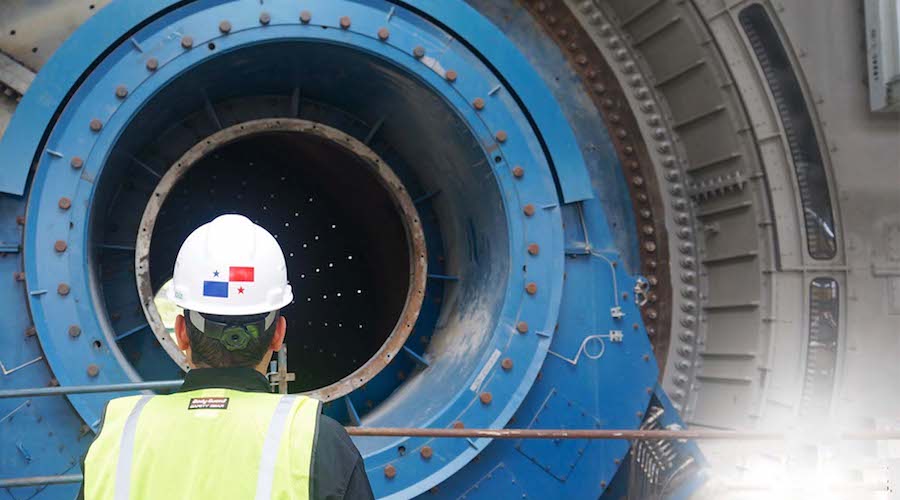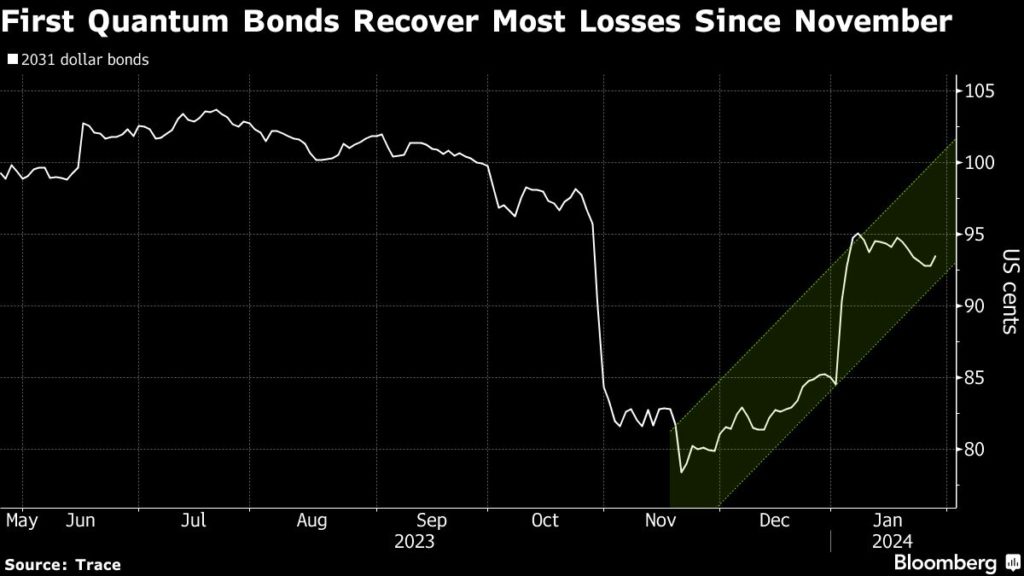First Quantum bonds rally as miner works to free up cash

First Quantum Minerals Ltd.’s dollar bonds have staged a rebound, recovering most of the losses they incurred amid a fallout with Panama over the company’s copper mine.
The most liquid notes due in 2031 climbed 15 cents on the dollar to 94 cents since hitting a low in November, according to Trace data. The rally comes as the Vancouver-based company plans to slash costs and raise cash, fueling investor confidence that it can keep servicing its debt, with takeover hopes and the upcoming presidential election also lifting sentiment.
First Quantum in November suspended production at the $10 billion Cobre Panama mine, its top money-maker that accounted for 1.5% of global copper output, as protesters blocked supplies. A Supreme Court ruling later that month deemed a revised contract with the government unconstitutional, leading President Laurentino Cortizo to order the closing of the mine.
Panamanians protested the contract — which gave First Quantum the right to produce copper at the site for at least another 20 years — on the grounds that terms were overly generous to the company and violated the nation’s sovereignty over mineral resources.
The events cast uncertainty over First Quantum’s finances, but since then, the company’s efforts to free up cash, investor outreach by Canada’s Barrick Gold Corp. and the elections in May have stoked a nearly 20% surge in the bonds.

Capital management
First Quantum last month said it’s considering a range of capital-market options to offset the closure of the mine, which accounted for 78% of operating profit in the first nine months of 2023. The company is working with banks to extend its bank loan facilities and weighing selling stakes in larger mining assets.
For James Soares, an investment director at asset manager Abrdn Plc, the measures are instilling confidence that “there is a way out of this.” Abrdn held on to the debt during the selloff, according to data compiled by Bloomberg. “They have a stable of quality assets, so they should be able to shore up their liquidity through a number of different levers,” Soares said.
First Quantum’s plan could ease pressures on the balance sheet as its remaining operations suffice to support the debt load, Bloomberg Intelligence analysts Grant Sporre and Richard Bourke wrote in a Jan. 23 note. First Qantum has $625 million of debt due coming due this year, followed by $1.8 billion in 2025, $1 billion in 2026 and $1.5 billion in 2027, according to data compiled by Bloomberg.
“If First Quantum can address maturities through 2026, it would have until October of 2027 to put forward a solution to restart Cobre Panama,” the analysts wrote.
M&A rumors
Barrick, which sounded out investors about a potential deal last year, is confident that it could resolve the situation in Panama, chief executive Mark Bristow said, Bloomberg News reported in January.
“If Barrick got more serious, then you are going to see another jump in the bonds,” Abrdn’s Soares said. First Quantum’s bonds would likely trade more similar to Barrick’s, resulting in an appreciation in dollar terms, he said. “That would probably be the best outcome for bondholders,” he added.
The gold miner’s most liquid dollar bonds due in 2034 on Friday traded at 124 cents on the dollar with a yield of 5.3%, more than four percentage points lower than the yield on First Quantum’s notes that mature in 2031, according to Trace data. S&P Global Ratings in December downgraded First Quantum’s credit to B with a negative outlook, seven notches below Barrick’s investment-grade BBB+ rating.
Barrick and First Qantum on Jan. 18 denied a report of a meeting among executives in Panama. It isn’t clear whether Barrick has made an offer to First Quantum, or whether it will do so at a later point in time.
First Quantum declined to comment, while Barrick didn’t respond to a request for comment.
May election
Another factor is the upcoming presidential election. It could result in a policy change, which ultimately might lead to a renegotiation of the mining contract, said Ramiro Blazquez, head of research and strategy at BancTrust & Co. One of the leading candidates, former president Ricardo Martinelli, has publicly supported a contract with First Quantum.
Martinelli “will be keen in getting more resources, particularly if he wants to exchange higher spending for political support,” Blazquez said. Revenues from the mine accounted for about 0.9% of Panama’s gross domestic product.
The firm has filed two notices of arbitration and submitted a plan to preserve and manage the asset. Chief executive officer Tristan Pascall said that First Quantum remains committed to Panama and its flagship mine.
“If you had a new set of people in power, you potentially could have a scenario where in a couple of years time that mine maybe doesn’t have to be shut,” said Omotunde Lawal, head of EM corporate debt at Barings Investment Services Ltd. Barings held on to the bonds, according to data compiled by Bloomberg.
Martinelli however faces corruption allegations and could be barred from running, after a top court rejected his appeal. Another candidate, Ricardo Lombana, spoke positively about the reneged contract but has changed his rhetoric since the protests got underway. Martinelli and Lombana didn’t immediately respond to requests for comment.
There is “a lot of optimism baked into the current yields that the mine eventually restarts,” said Matthew Farwell, an analyst at Odeon Capital Group LLC.
(By Zijia Song)
{{ commodity.name }}
{{ post.title }}
{{ post.date }}




Comments